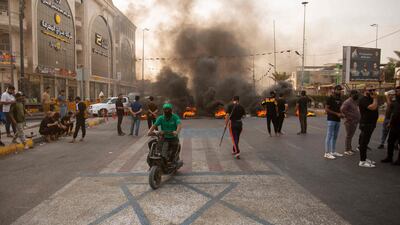Calm returned to Baghdad on Wednesday after 24 hours of heavy fighting in the capital, after clashes between militias loyal to Moqtada Al Sadr, the popular nationalist cleric, and Iran-backed groups.
Violence flared up after the cleric called for new waves of protesters to occupy the Green Zone ― the seat of government in Iraq, after he said he was resigning from politics in protest at actions by a rival political coalition, the Co-ordination Framework. The rival coalition includes Iran-linked parties and Mr Al Sadr’s arch foe, former prime minister Nouri Al Maliki.
But clashes also occurred throughout the country’s volatile south, with rival Shiite groups burning political party offices. Basra, Iraq’s second largest city ― and by some accounts its poorest ― has historically been a flashpoint between the rival Shiite groups.
A day after the clashes, tyres set alight earlier in the week still send smoke skywards. Because a public holiday was announced by the central government, no municipal workers are on the streets to clean up the protest sites.
Protesters are now left to ponder what’s next for their movements and Iraq. Basra native Majed Ali, 41, said Mr Al Sadr’s call to withdraw was the right thing to stop the bloodshed, but “it is not withdrawal of losers, no, it is like a victory against Iraq’s enemies [referring to Iran-backed militias]”.
Mr Ali said he wished to continue the protest to “clean the country [of] corrupted politicians, but we all respect the Sadr decision to save Iraq”.
Mr Al Sadr said he would resign from politics last week after 10 months of failed negotiations to form a government. Many dismissed the move as a ploy to gain greater leverage, and his supporters stormed the Green Zone, breaching the gates of the government palace, rushing into its lavish salons and marbled halls.
At least 30 people were killed in the clashes, AFP reported, after which Mr Al Sadr gave his supporters 60 minutes to leave the capital.
“I feel so sad for killing many protesters, regardless of their affiliations, they are Iraqis. I wish Sadr would go back to politics as he played a vital role to keep Iraq away from external pressure, mainly from Iran,” Mr Ali said.
“Sadr is a safety valve to Iraq, and I hope the governments and other neutral parties decide to dissolve the parliaments and go forward a very quick election.”
Iraq's oil exports have not been affected by the turmoil in the country, three sources told Reuters on Tuesday, despite Mr Al Sadr’s supporters surrounding Basra’s Majnoon oil field and 210,000-barrel-per-day Basrah refinery.
Iraq’s people are yet to see any real development off the back of oil revenues, as the government formation process stagnates.
Amal Khairi, 48, said she had lost hope of any bright future for her family amid the squabbling by politicians. She said she does not back any militias or political factions, but praised Mr Al Sadr’s decision to withdraw his supporters.
“My son, Mohammed, is a baccalaureate student in his last year of secondary school. He could not go for exams as the Ministry of Education suspended them until further notice.
I am so afraid for my son’s future,” she said.
“I am hopeless that Iraq will be stable or be clear from militias as long as there is a government whose politicians take care of themselves, not the people's favour, she said.
Life in the city began to return to normal on Tuesday afternoon, as businesses and shops gradually opened.



























